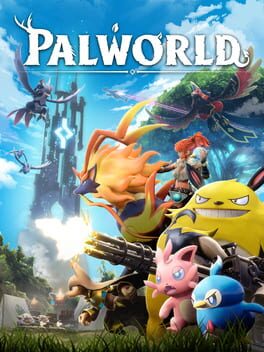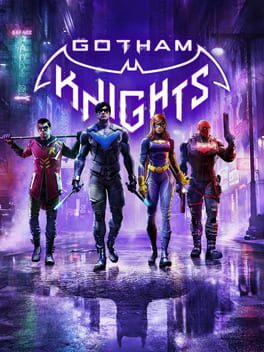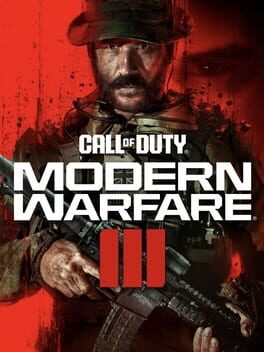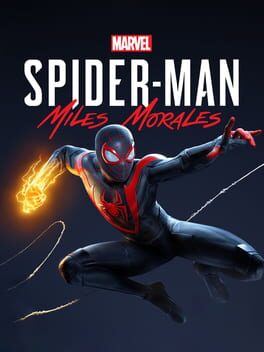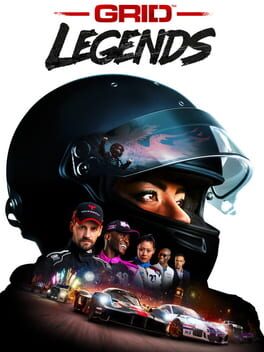poogy
84 reviews liked by poogy
Palworld
2024
This review contains spoilers
There isn't really a whole lot to say about Spider-Man 2 because in reality, most of what you can say about the previous Insomniac Spider-Man games still holds true even now. Even story-wise, almost every beat is exactly what you'd expect based on both the comics they draw inspiration from and also just how they've written these games in the past. The symbiote storyline is so well-known and so hard to innovate upon that there really wasn't much Insomniac could do other than tell the same story again and hopefully be competent at it in the process. I think they succeeded, but there is one weird thing that happens towards the end, one that only seems to exist because this story happens to be told in the medium of video games.
I'm talking about the presence of the "Anti-Venom" suit, and it's something that got me thinking once again about a subject that's been on my mind for years but I've struggled to put into words. Because despite my issues with Anti-Venom that we'll get to in a moment, it's also fairly inconsequential. Anything and everything I say about it will inevitably be countered with "it's fun" and I wouldn't even disagree with that. This is not meant to be an "Anti-Venom makes the game bad" criticism, but rather it's a symptom of a larger problem I have with our collective understanding of game design, not just for Spider-Man games, but for almost all video games.
But before I get to those wider issues, let's talk about this one video game first. Spider-Man 2, among other things, is an adaptation of the fairly iconic "Black Suit" Spider-Man storyline, in which Spider-Man comes into contact with a mysterious black substance that turns into a new suit that gradually warps his mind until he isn't truly himself anymore, corrupted by the alien symbiote that is what he initially thought was just a fancy costume. Eventually, of course, he is able to reject the symbiote's influence and tear off the gooey "suit", leading the symbiote to seek out a new host and become the villainous Venom. If you've seen one version of this story, you've seen them all. Spider-Man 2 is doing nothing different in that regard.
Yuri Lowenthal, who plays Peter Parker in these games, recently did an interview where he likened his version of Peter being corrupted by the symbiote to addiction. At first the rush of power the symbiote gives Peter is great, but over time, he becomes more and more dependent on it, until he serves it rather than the other way around. I'm no expert on addiction here, but the analogy seems decent enough. And I think we can apply that to more than just his performance or even the writing, but to an extent, the game design.
After Peter finally dons the symbiote suit in Spider-Man 2, you'll instantly feel a change in the gameplay. For starters, you unlock the new Symbiote Surge ability, one that temporarily puts Peter into a state where he can utterly wallop most enemies in just a few attacks, essentially a "mash square to win" button. In addition, new symbiote powers replace abilities that previously utilized Peter's Iron Spider legs. And quite frankly, these symbiote abilities are far more useful than the Iron Spider ones ever were. In particular, the Symbiote Yank, which allows you to instantly grab a group of enemies in a surprisingly large area in front of you and then slam them down, taking every enemy affected by it out of commission for a moment while also doing heavy damage, is a life-saver on higher difficulties where large groups of enemies can feel like a death sentence.
Because of this, because the Symbiote has empowered Peter so much, as you play it's hard to imagine going back to a world without them. Even the powerful electric abilities of the other Spider-Man, Miles Morales, don't feel as devastating as anything you can accomplish with the Symbiote's power. Like in the story, in gameplay you'll come to be dependent on the Symbiote's abilities more and more, especially as the "Hunter" enemies pose a far more significant challenge than the basic gangsters you fight at the start of the game.
So, when you reach a point in the story that the time finally comes for Peter to reject the Symbiote and take off that black suit once and for all, you immediately notice the difference. Those old Iron Spider abilities you're now forced back into using just don't pack the same punch, and the aforementioned Symbiote Surge is gone, not even replaced with some lesser alternative. You have been put into a feeling of withdrawl, perfectly capturing the toxic influence of the symbiote. Video games are an interactive medium, after all, and here they successfully managed to convey narrative through the gameplay itself.
And then a handful of story missions later, we find out Peter has a piece of the symbiote still lingering inside him which is then cured by Mister Negative's powers, giving him the white Anti-Venom suit, essentially a version of the symbiote that won't mess with his head. Which means all those powers you lost earlier in the story are back. Although two of the previous symbiote abilities are replaced with slightly less powerful variants, two of them return completely unaltered from their original versions. On top of this, the Symbiote Surge, which caused you to play as the brutal, highly aggressive madman the symbiote turns you into, also comes back completely unchanged. Even in the story, this is outright described as having all the power of the original symbiote with none of the consequences.
I don't need to go into too much detail about why I take issues with this, right? It immediately goes back on all the praise I just laid on the gameplay/story synergy they achieved with the symbiote. Of course, I know why this was done. The symbiote was fun! Why take that power away from the player forever? Why leave one Spider-Man with less combat options than the other? And I'm not here to say the game is ruined because of this or anything, but just because I understand the thought process here doesn't mean I agree with it.
This moment is, I think, a good encapsulation of an approach to game design I wish had become less normalized. As much as we all like the idea of gameplay and narrative both working in harmony to tell the same story, too often there is a tension between doing that and still prioritizing "fun" above all else. And this is where we run into trouble, because when I say that, it sounds like I'm saying games should be less fun, which is not the case. I'm generally a completionist when it comes to the games I play, so it's not as if I want that experience to be painful.
What I'm trying to say is that I think most people who play games want video games to be taken seriously as an art form. And I think to some extent, that idea has become vastly more popular now than it was, say, 10 years ago. But I still wouldn't consider it quite "mainstream" yet, and I think there are a few roadblocks to that, and part of that comes down to how we think about game design. Fundamentally, even though we still understand games as being able to tell stories, to communicate emotions, they're still seen as "lesser", something meant to be enjoyed in the same way as a toy moreso than any other narrative medium.
I'm talking about this with Spider-Man 2 not because I think it is the most important game to placed within this phenomenon. It's, obviously, a mainstream AAA game meant to drive up console sales. We were not robbed of some deep artistic experience because it made certain choices. But that whole Anti-Venom thing finally helped me put together these thoughts. Its inclusion, fundamentally, treats the game as a toy. And that's fine! Toys are fun! Again, my takeaway here is not to say that the game is bad because of this, or that it shouldn't exist in the form it does. But it's not as if it's the only game we're designing this way.
I think there's just a fear in game design, more than any other medium, of losing the player's interest. Games require the most money to buy into of almost any art form. For the price of a single AAA video game, you're paying the equivalent of more movie tickets than you can count on one hand, or a few months of a streaming service where you could find several shows you want to watch. So there's an expectation that, when you buy a game, you're going to get something worth the money you put into it. There's a reason AAA open world games have become so homogenized.
But this mindset isn't one that I think indie games are immune to either. I don't think most indie games are really trying for anything less, even if there is somewhat more variation in the types of games being made. But any indie that tries to, perhaps, experiment with our typical notion of "fun" in order to generate unique meaning through its interactivity, it's often ignored entirely or met with derision. The existence of the term "walking simulator" is perhaps the clearest example of this phenomenon.
But I think even games that are more conventional than, say, Gone Home, are able to perhaps subvert this "fun at all costs" mindset. For example, Undertale is a pretty typical turn-based RPG for the most part, albeit mixed with some bullet hell elements. However, it also features the infamous "genocide" route, which forces you to grind for what feels like hours in order to achieve it as a way of commenting on how what you're doing is senseless and pointless and is solely motivated by wanting to see what will happen at the end. It's not exactly "fun" outside of the few cool unique boss fights that exist seemingly just to generate word of mouth for this route and get people to try it, but the story it tells through the player's own interactions with it is incomparable.
The reason this all matters to me so much is, again, not because I think Spider-Man 2 is terrible or even unique to having these problems. But it's just one of those examples that gets you thinking about these sorts of things precisely because it actually gets these things right at first, only to trip over itself just before the finish line. Something I don't think I've talked about before is that game design is a field I am interested in working in one day, so I kind of can't help but think about the games I play this way. All of these questions of how we approach design are not just ones I'm asking others, but also ones I might have to ask myself one day if I'm put in the position of designing my own game.
So hopefully it's clear that this review isn't really about Spider-Man 2. It's about video games as a whole and how we think about them. And I still think I've really only scratched the surface on this topic of how we're designing games like toys, but talking any more about it felt like too much of a tangent. Again, this is something that's been on my mind for years, this game just happened to be the one that got me to start putting it into words. Video games are such an interesting medium for storytelling not just because of the way the player's actions can impact the narrative, but how the narrative can reflect those actions back at the player and make them question things about themselves. We can challenge people playing games on more levels than mechanical skill, we just have to try.
I'm talking about the presence of the "Anti-Venom" suit, and it's something that got me thinking once again about a subject that's been on my mind for years but I've struggled to put into words. Because despite my issues with Anti-Venom that we'll get to in a moment, it's also fairly inconsequential. Anything and everything I say about it will inevitably be countered with "it's fun" and I wouldn't even disagree with that. This is not meant to be an "Anti-Venom makes the game bad" criticism, but rather it's a symptom of a larger problem I have with our collective understanding of game design, not just for Spider-Man games, but for almost all video games.
But before I get to those wider issues, let's talk about this one video game first. Spider-Man 2, among other things, is an adaptation of the fairly iconic "Black Suit" Spider-Man storyline, in which Spider-Man comes into contact with a mysterious black substance that turns into a new suit that gradually warps his mind until he isn't truly himself anymore, corrupted by the alien symbiote that is what he initially thought was just a fancy costume. Eventually, of course, he is able to reject the symbiote's influence and tear off the gooey "suit", leading the symbiote to seek out a new host and become the villainous Venom. If you've seen one version of this story, you've seen them all. Spider-Man 2 is doing nothing different in that regard.
Yuri Lowenthal, who plays Peter Parker in these games, recently did an interview where he likened his version of Peter being corrupted by the symbiote to addiction. At first the rush of power the symbiote gives Peter is great, but over time, he becomes more and more dependent on it, until he serves it rather than the other way around. I'm no expert on addiction here, but the analogy seems decent enough. And I think we can apply that to more than just his performance or even the writing, but to an extent, the game design.
After Peter finally dons the symbiote suit in Spider-Man 2, you'll instantly feel a change in the gameplay. For starters, you unlock the new Symbiote Surge ability, one that temporarily puts Peter into a state where he can utterly wallop most enemies in just a few attacks, essentially a "mash square to win" button. In addition, new symbiote powers replace abilities that previously utilized Peter's Iron Spider legs. And quite frankly, these symbiote abilities are far more useful than the Iron Spider ones ever were. In particular, the Symbiote Yank, which allows you to instantly grab a group of enemies in a surprisingly large area in front of you and then slam them down, taking every enemy affected by it out of commission for a moment while also doing heavy damage, is a life-saver on higher difficulties where large groups of enemies can feel like a death sentence.
Because of this, because the Symbiote has empowered Peter so much, as you play it's hard to imagine going back to a world without them. Even the powerful electric abilities of the other Spider-Man, Miles Morales, don't feel as devastating as anything you can accomplish with the Symbiote's power. Like in the story, in gameplay you'll come to be dependent on the Symbiote's abilities more and more, especially as the "Hunter" enemies pose a far more significant challenge than the basic gangsters you fight at the start of the game.
So, when you reach a point in the story that the time finally comes for Peter to reject the Symbiote and take off that black suit once and for all, you immediately notice the difference. Those old Iron Spider abilities you're now forced back into using just don't pack the same punch, and the aforementioned Symbiote Surge is gone, not even replaced with some lesser alternative. You have been put into a feeling of withdrawl, perfectly capturing the toxic influence of the symbiote. Video games are an interactive medium, after all, and here they successfully managed to convey narrative through the gameplay itself.
And then a handful of story missions later, we find out Peter has a piece of the symbiote still lingering inside him which is then cured by Mister Negative's powers, giving him the white Anti-Venom suit, essentially a version of the symbiote that won't mess with his head. Which means all those powers you lost earlier in the story are back. Although two of the previous symbiote abilities are replaced with slightly less powerful variants, two of them return completely unaltered from their original versions. On top of this, the Symbiote Surge, which caused you to play as the brutal, highly aggressive madman the symbiote turns you into, also comes back completely unchanged. Even in the story, this is outright described as having all the power of the original symbiote with none of the consequences.
I don't need to go into too much detail about why I take issues with this, right? It immediately goes back on all the praise I just laid on the gameplay/story synergy they achieved with the symbiote. Of course, I know why this was done. The symbiote was fun! Why take that power away from the player forever? Why leave one Spider-Man with less combat options than the other? And I'm not here to say the game is ruined because of this or anything, but just because I understand the thought process here doesn't mean I agree with it.
This moment is, I think, a good encapsulation of an approach to game design I wish had become less normalized. As much as we all like the idea of gameplay and narrative both working in harmony to tell the same story, too often there is a tension between doing that and still prioritizing "fun" above all else. And this is where we run into trouble, because when I say that, it sounds like I'm saying games should be less fun, which is not the case. I'm generally a completionist when it comes to the games I play, so it's not as if I want that experience to be painful.
What I'm trying to say is that I think most people who play games want video games to be taken seriously as an art form. And I think to some extent, that idea has become vastly more popular now than it was, say, 10 years ago. But I still wouldn't consider it quite "mainstream" yet, and I think there are a few roadblocks to that, and part of that comes down to how we think about game design. Fundamentally, even though we still understand games as being able to tell stories, to communicate emotions, they're still seen as "lesser", something meant to be enjoyed in the same way as a toy moreso than any other narrative medium.
I'm talking about this with Spider-Man 2 not because I think it is the most important game to placed within this phenomenon. It's, obviously, a mainstream AAA game meant to drive up console sales. We were not robbed of some deep artistic experience because it made certain choices. But that whole Anti-Venom thing finally helped me put together these thoughts. Its inclusion, fundamentally, treats the game as a toy. And that's fine! Toys are fun! Again, my takeaway here is not to say that the game is bad because of this, or that it shouldn't exist in the form it does. But it's not as if it's the only game we're designing this way.
I think there's just a fear in game design, more than any other medium, of losing the player's interest. Games require the most money to buy into of almost any art form. For the price of a single AAA video game, you're paying the equivalent of more movie tickets than you can count on one hand, or a few months of a streaming service where you could find several shows you want to watch. So there's an expectation that, when you buy a game, you're going to get something worth the money you put into it. There's a reason AAA open world games have become so homogenized.
But this mindset isn't one that I think indie games are immune to either. I don't think most indie games are really trying for anything less, even if there is somewhat more variation in the types of games being made. But any indie that tries to, perhaps, experiment with our typical notion of "fun" in order to generate unique meaning through its interactivity, it's often ignored entirely or met with derision. The existence of the term "walking simulator" is perhaps the clearest example of this phenomenon.
But I think even games that are more conventional than, say, Gone Home, are able to perhaps subvert this "fun at all costs" mindset. For example, Undertale is a pretty typical turn-based RPG for the most part, albeit mixed with some bullet hell elements. However, it also features the infamous "genocide" route, which forces you to grind for what feels like hours in order to achieve it as a way of commenting on how what you're doing is senseless and pointless and is solely motivated by wanting to see what will happen at the end. It's not exactly "fun" outside of the few cool unique boss fights that exist seemingly just to generate word of mouth for this route and get people to try it, but the story it tells through the player's own interactions with it is incomparable.
The reason this all matters to me so much is, again, not because I think Spider-Man 2 is terrible or even unique to having these problems. But it's just one of those examples that gets you thinking about these sorts of things precisely because it actually gets these things right at first, only to trip over itself just before the finish line. Something I don't think I've talked about before is that game design is a field I am interested in working in one day, so I kind of can't help but think about the games I play this way. All of these questions of how we approach design are not just ones I'm asking others, but also ones I might have to ask myself one day if I'm put in the position of designing my own game.
So hopefully it's clear that this review isn't really about Spider-Man 2. It's about video games as a whole and how we think about them. And I still think I've really only scratched the surface on this topic of how we're designing games like toys, but talking any more about it felt like too much of a tangent. Again, this is something that's been on my mind for years, this game just happened to be the one that got me to start putting it into words. Video games are such an interesting medium for storytelling not just because of the way the player's actions can impact the narrative, but how the narrative can reflect those actions back at the player and make them question things about themselves. We can challenge people playing games on more levels than mechanical skill, we just have to try.
Gotham Knights
2022
This is one of those games that you pretty much know within the first hour what the rest of the game is going to be like. Its just a bland, grindy, uninteresting Arkham game, except Arkham City came out 13 years ago and is infinitely more polished and more fun. 3 hours is enough for me to know that its just going to go down the boring grind road.
Gotham Knights
2022
Some funs levels and impressive production value hampered by what has now been confirmed as a clearly rushed schedule. Multiplayer is fun at points but too grindy and cluttered by the continued progression from nuMWII because this was initially just supposed to be an expansion after they promised two years of support for the last game.
In between the actual fun and flashy spectacle levels you are treated to "Open Combat" missions, which are basically just multiplayer maps/sections from the new warzone map cordoned off with random enemies and objects scattered everywhere. This would probably work fine as a 1 or 2 level gimmick, but it's almost every other level and it's clear the game isn't built for it in most cases. You're just playing solo warzone against bots! The other games tease this sort of concept but here it's just painfully lazy, missions try to encourage stealth but clearly aren't built with any thought, often making you run directly out into the open with no cover and absolutely never letting you shoot out lights in otherwise dark areas, a feature present in a game that came out 4 years prior.
There are definitely fun ideas in these levels, they try to soften the blow with half baked imsim elements where you have to solve basic puzzles to get the good guns and equipment. There's a kind of fun bit where you get to run around moving shipping equipment for one level but the only one where it really comes together is a close quarters one where you get to run around and parkour between these 4 different hollowed out apartment complexes while the enemies chase you around. It's not very call of duty but what is at this point?
Story is pretty boilerplate and safe. Makarov breaks out of prison and does no russian (except this time the staging doesnt make any sense at all) but this time it doesn't actually do anything and no one falls for it. In the original he starts a war with 5 guys and just fucks off to let the russian american war consume the rest of the plot, but here you spend the entire time fighting him because he somehow has as many guys as the entire russian army. Despite this almost none of their terrorist attacks are effective and you always nullify their effects the during or after the level they happen. All these innocent people dying is certainly really intense but apparently none of it ever has any consequences and no one seems to really give a shit anyways. At once point you catch Sheperd alone in the middle of nowhere and instead of getting to knife him in the face like in the original you just convince him to voluntarily get tried by congress.
Also, not something I normaly complain about with performance capture, but Makarov and his second in command look so fucking ugly in a really unintimidating way. They look like soy conservative podcasts commentators. All I could think about during any scene with him is how he could launch into lecturing me about how I need to get a trad wife at any moment.
I think the main amount of hate this is getting is the length, which to be fair it is short and ends insanely abruptly. If this was just 2-3 hours longer I think people would have been fine with it but it ends during a really subdued anticlimatic level where Makarov escapes and they tease a 4th game. Just end it! Are ideas at Activision so sparse that they can only rely on the FOURTH game in a reboot of an existing subseries? Go to space again who gives a shit! It sells like hotcakes regardless!
In between the actual fun and flashy spectacle levels you are treated to "Open Combat" missions, which are basically just multiplayer maps/sections from the new warzone map cordoned off with random enemies and objects scattered everywhere. This would probably work fine as a 1 or 2 level gimmick, but it's almost every other level and it's clear the game isn't built for it in most cases. You're just playing solo warzone against bots! The other games tease this sort of concept but here it's just painfully lazy, missions try to encourage stealth but clearly aren't built with any thought, often making you run directly out into the open with no cover and absolutely never letting you shoot out lights in otherwise dark areas, a feature present in a game that came out 4 years prior.
There are definitely fun ideas in these levels, they try to soften the blow with half baked imsim elements where you have to solve basic puzzles to get the good guns and equipment. There's a kind of fun bit where you get to run around moving shipping equipment for one level but the only one where it really comes together is a close quarters one where you get to run around and parkour between these 4 different hollowed out apartment complexes while the enemies chase you around. It's not very call of duty but what is at this point?
Story is pretty boilerplate and safe. Makarov breaks out of prison and does no russian (except this time the staging doesnt make any sense at all) but this time it doesn't actually do anything and no one falls for it. In the original he starts a war with 5 guys and just fucks off to let the russian american war consume the rest of the plot, but here you spend the entire time fighting him because he somehow has as many guys as the entire russian army. Despite this almost none of their terrorist attacks are effective and you always nullify their effects the during or after the level they happen. All these innocent people dying is certainly really intense but apparently none of it ever has any consequences and no one seems to really give a shit anyways. At once point you catch Sheperd alone in the middle of nowhere and instead of getting to knife him in the face like in the original you just convince him to voluntarily get tried by congress.
Also, not something I normaly complain about with performance capture, but Makarov and his second in command look so fucking ugly in a really unintimidating way. They look like soy conservative podcasts commentators. All I could think about during any scene with him is how he could launch into lecturing me about how I need to get a trad wife at any moment.
I think the main amount of hate this is getting is the length, which to be fair it is short and ends insanely abruptly. If this was just 2-3 hours longer I think people would have been fine with it but it ends during a really subdued anticlimatic level where Makarov escapes and they tease a 4th game. Just end it! Are ideas at Activision so sparse that they can only rely on the FOURTH game in a reboot of an existing subseries? Go to space again who gives a shit! It sells like hotcakes regardless!
Cities: Skylines II
2023
Grid Legends
2022
It's a shame this is a modern EA game engineered for subscription services first and foremost, because the racing is pretty good, and the storyline is engaging, you just don't get all that much of it unless you buy DLC "seasons".
Outside of the story mode, the career mode is pretty barebones, despite a healthy number of tracks and modes. I just wish it landed somewhere between those extremes.
Outside of the story mode, the career mode is pretty barebones, despite a healthy number of tracks and modes. I just wish it landed somewhere between those extremes.
